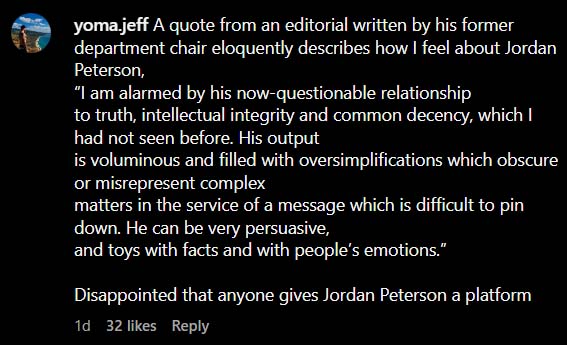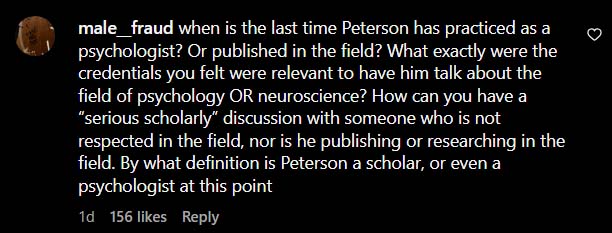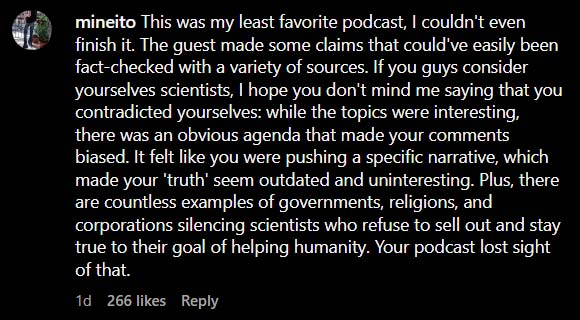Andrew Huberman’s decision to feature Jordan Peterson on his podcast sparked widespread frustration among his fans, signaling a potential departure further away from his science-based roots.
Peterson’s early career was rooted in clinical psychology, earning respect for his research and engaging lectures on personality theory and mythology. However, as his popularity grew, his focus shifted. He began reframing complex sociological and philosophical topics through an ideological lens, often oversimplifying or misrepresenting them. His critiques of Marxism, for instance, highlight a superficial understanding, reducing nuanced theories to simplistic caricatures.
This pivot mirrored a broader trend: his transition from academic rigor to ideological activism. Once celebrated for practical advice like “clean your room” and “stand up straight,” Peterson’s rhetoric now often intertwines evolutionary psychology with claims that veer into questionable metaphysical territory. This shift alienated many who once admired his work.
The controversy surrounding his personal life further complicated his narrative. His handling of a benzodiazepine habit raised eyebrows. Rather than embracing the vulnerability he often preaches, Peterson framed his experience in a narrative of external persecution, a stark contrast to his emphasis on personal accountability.













On social media, Peterson has increasingly aligned himself with reactive culture war discourse, frequently targeting critical theorists and mislabeling them as “neo-Marxists.” This pattern highlights his growing detachment from his original academic discipline. His pronouncements on topics like climate science and economics often lack depth, showcasing a limited engagement with established research.
Fans of Huberman, known for his commitment to science-based discussions, expressed disappointment at the platforming of Peterson. For many, it represents a broader shift in the podcast’s direction, moving toward controversial figures who generate clicks rather than fostering meaningful scientific dialogue.
The irony of Peterson’s trajectory lies in his critique of postmodernism. His approach to truth and meaning now appears increasingly postmodern itself, prioritizing narrative utility over empirical evidence. This evolution underscores the tension between his earlier work and his current public persona.
This shift in tone and platforming of divisive figures reflects a growing trend seen in broader intellectual and wellness circles. Parallel examples abound in the world of New Age spiritualism and alternative health, where ideological and conspiratorial beliefs have taken root. In an exclusive report by the Los Angeles Times, the intersection of wellness culture and conspiracy theories, particularly QAnon, was explored in depth.
A world traditionally associated with love, light, and acceptance has increasingly made room for radicalized ideas. This phenomenon has disrupted communities and fractured long-standing relationships. Laura Schwartz, a yoga teacher from Carlsbad, coined the term “Woo-Anon” to describe this disturbing trend. Many in wellness circles—yogis, energy healers, and crystal practitioners—have embraced conspiratorial thinking, driven in part by the anti-establishment ethos of natural wellness practices.
The New Age wellness industry, a $1.5 trillion market, has always been fertile ground for distrust in institutional healthcare. But the COVID-19 pandemic accelerated a dangerous convergence of wellness influencers with QAnon ideologies. This alignment has sown confusion and mistrust while alienating more scientifically inclined practitioners.
Derek Beres and Julian Walker, co-hosts of the “Conspirituality” podcast, have tracked this trend. They note how Instagram has become a breeding ground for these ideas, using “pastel QAnon” tactics to lure followers with soothing aesthetics and pseudoscientific language. For influencers, taking definitive—and often controversial—stances on social media has proven to be an effective way to grow their brands, even at the expense of spreading misinformation.
Not unlike Peterson’s pivot, many wellness influencers have gravitated toward ideological narratives that generate engagement, despite their tenuous connection to reality. Huberman’s choice to feature Peterson might be symptomatic of this broader cultural shift, where attention often trumps substance, and polarizing personalities dominate the discourse.


